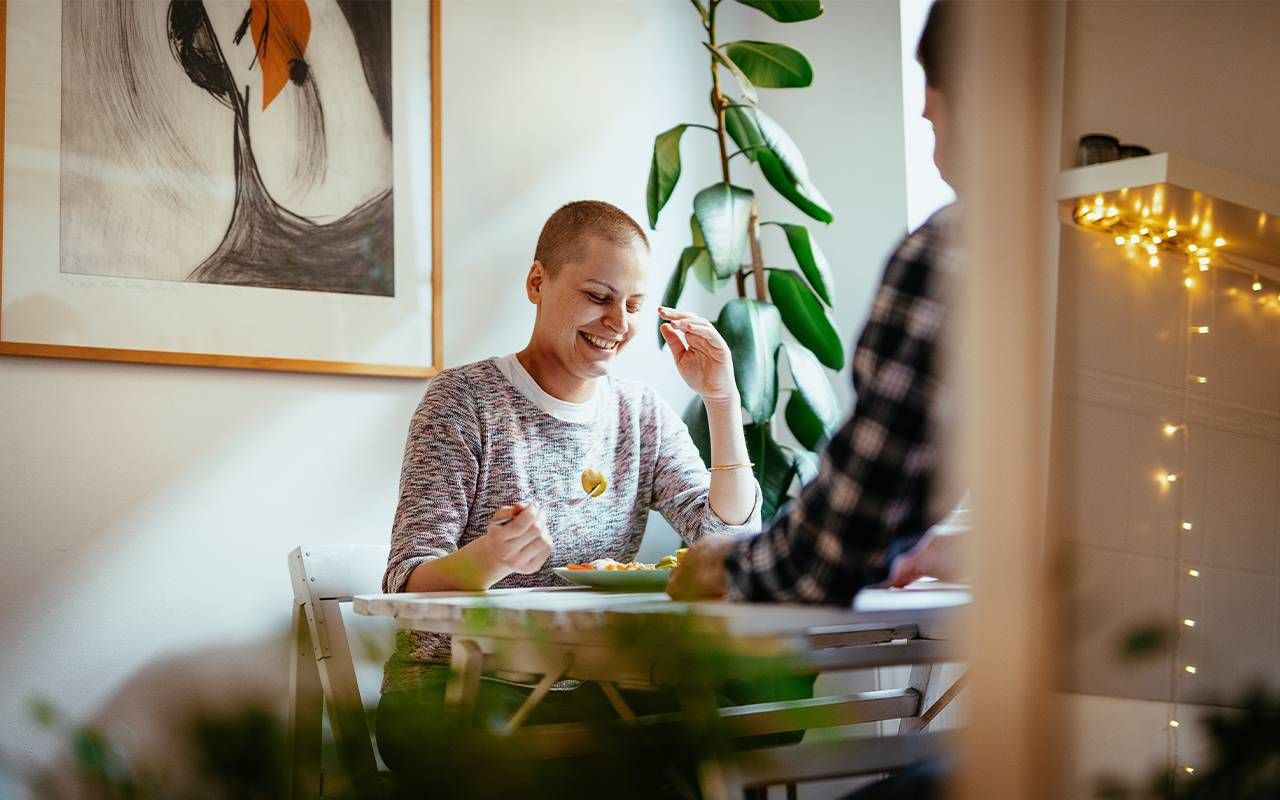Never Visit a Dying Person
The author recalls precious time spent with a friend named Sharon and how she learned the importance of visiting the person, not their disease or prognosis
Never visit a dying person.
I bet you're scratching your head right now. Why wouldn't you want to visit a dying person? Would you abandon your wife, husband, mother, father, sister, brother, best friend at a time like that? Of course, you wouldn't.
Before a fit of disgust at my callousness takes over, I'm going tell you what I mean when I say, Never visit a dying person.

After a young woman named Beyhan died, her friends put together her words and published a small book called "Beyhan's Journey." Beyhan said, I could always tell when someone was visiting a dying person. She meant that because they no longer saw her as the person she still was, they treated her differently. The message is this: Visit the person, not their disease, diagnosis or prognosis.
As I walked to her doorway, I said a small prayer. If I can't say anything wonderful, please don't let me say anything that could hurt.
In 1990, while sitting at my desk working on my dissertation, my phone rang. The voice on the other end said, "Hi, Ginni, it's Sharon."
"Hi, Sharon. How are you?"
"Not so good. I have lung cancer and the doctors have told me I have two months to live." Sharon had never smoked.
I told her I'd like to visit but had a cold. I asked if I could call when I felt well enough to come over.
A couple weeks later, I pulled up to her charming home in Palo Alto. Although born in Toronto, Ontario, Canada, Sharon's home and garden had an English aesthetic. As I walked to her doorway, I said a small prayer. If I can't say anything wonderful, please don't let me say anything that could hurt. I also repeated advice offered by one of my more spiritual teachers: Show up, pay attention, tell the truth and don't be attached to the outcome.
Armed with only my small prayer and words of advice, I knocked on Sharon's door.
Sharon had always been slender, but she'd lost weight. She still had all of her short, blonde hair. Total hair loss was still a few weeks away. Her blue eyes were now more vibrant against her pink cheeks. Seeing me, she smiled, opened her arms and wrapped them around me.
Although we did simple things, against the backdrop of diminishing time, each moment filled itself with profound meanings and connections.
No Agenda
For the next ten months, I visited Sharon every week or so. Always arriving with no preconceived agenda, I let our time together unfold with Sharon leading the way. Although we did simple things, against the backdrop of diminishing time, each moment filled itself with profound meanings and connections.
Sometimes we'd sit in her garden and talk as we sipped our hot tea. Other times, she had me drive her places because she had things she wanted to accomplish.
She wanted to buy a tree to plant in her yard. As we meandered the aisles and she inspected the trees, she said, "The cancer has moved into my bowel." She spoke casually, as if sharing that she'd bought a new blouse. As we walked on, she added matter-of-factly that the pain was getting harder to control. She picked out a lovely tree with lavender flowers.
Another time, we enjoyed the shops on the main street in Los Altos. In one shop, she selected a cozy for her tea pot. In another, she noticed a small book, and asked if families usually had books for friends to sign. I told her yes, and she purchased the book. That day, she purchased other items she believed her husband and son would need after she was gone.
Preparing For the Time After Her Death
Sharon pragmatically prepared for the time she would no longer be here. As soon as I arrived one morning, she led me to her dining room and asked me to help her with the photos strewn across the table. On the back of each photo she wrote the names, their relation to her, and what they were doing. "I want my son to know his family when I won't be here to tell him," she said. Even as I write this now decades later, I still feel the sense of awe for this expression of love showed for her child.
And then there was the day I wished I could have been anywhere else. While on our way to a doctor's appointment, she talked about something I knew would happen after she was gone. I heard myself say I would tell her husband or son. Horrified, I realized I had bypassed her. I hoped she hadn't noticed, but she had. "Or, me, Ginni. You could tell me."
I remained silent, wishing I could find the eject button to push and release me from the car. It wouldn't have mattered to me if I splattered onto the road. I knew I had to say something or I'd never be able to talk or look at her again.
"I like being with you because, unlike the others, you've already thought about these things and don't treat me differently."
"Excuse my silence, Sharon. I'm trying to get my feet out of my mouth."
"Oh, Ginni," she said with a playful slap on my arm, "I'm not that sensitive." And we drove on.
Another day she was in her yard when I arrived, sitting with a woman who'd attended graduate school with us. Ruth, a therapy intern, asked Sharon questions about dealing with a client. She hung on every word Sharon spoke, as though each syllable contained the most important and profound thing she'd ever heard. When I spoke, Ruth brushed me off.
Before Ruth left, she hugged Sharon, and I noticed Sharon wince. Once she was gone, I asked Sharon if I'd ever hurt her when I hugged her. "Oh, no, Ginni, your hugs are perfect," she said.
She let me know that she'd noticed how Ruth had responded when I spoke and she didn't like it. We continued sitting outside in her English garden sipping tea. "I like being with you because, unlike the others, you've already thought about these things and don't treat me differently." She knew I worked with dying and grieving people.
Over dinner one night, a mutual acquaintance of ours from school said she wanted to see Sharon, "but I've never been with a dying person before."
"If you think you're visiting a dying person instead of realizing you're visiting Sharon, who's dealing with the biggest challenge of her life, then don't go," I said. Sheryl heard my words and a few days later went to see Sharon.
Sitting across from Sharon one morning in her yard, I couldn't believe what I saw. I blinked hard to reset my vision. She was transparent. She was ethereal, with spaces like a honeycomb.
"Sharon! I can see through you!"
She laughed. "You're not the first person who's told me that."
I wondered if maybe we don't die all at once and parts of us let go, moving on before our last breath. Even as part of her was fading, I saw Sharon's spirit shining with a vibrancy death couldn't touch.
Even as part of her was fading, I saw Sharon's spirit shining with a vibrancy death couldn't touch.
I met her son, 21 years old, one afternoon. The two of them were struggling to communicate. In their conversation and what they said to me, I realized they both saw her as a dying person. This colored their communication and stood between them speaking authentically.
When I pointed this out, they both stared at me for a moment. Then they turned towards each other and began sharing from their hearts, fear no longer standing between them. Sharon asked if I could come back in a week and work with them again. I agreed.
The day we were to meet, Sharon called to tell me it wasn't a good day to visit. I could barely hear her voice, and I knew. I purchased a beautiful card, wrote her a note, then headed to her house. Something stopped me from knocking on the door, so I left the card on her doorstep, hoping she'd be alive to read my words of love and gratitude, but sensing she wouldn't.
The Gift of a Blue Butterfly
I later learned that she probably took her last breath around the time I left the card.
About an hour later, her husband called to say she was gone. Sharon Brady was only 48 years old.
Ten months had passed too quickly since her first call to me. I immediately picked up something from the market her husband could share with visitors. Sharon wasn't there, at least not her body, but I could feel her everywhere.
Her husband retrieved a small package from their dining room table and handed it to me. Sharon had left a blue stained-glass butterfly she'd made and a handwritten card. In faded handwriting I knew must have been written through pain and the closeness of death, she said, Thank you for all your understanding, visits and kindness.
I never visited a dying person and Sharon knew it.
I still miss her.

Read More

